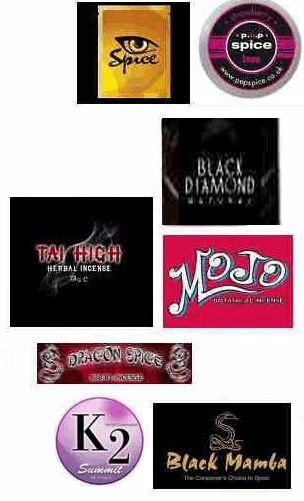..........“Spice” is used to describe a diverse family of herbal mixtures marketed under many names, including K2, fake marijuana, Yucatan Fire, Skunk, Moon Rocks, and others. These products contain dried, shredded plant material and presumably, chemical additives that are responsible for their psychoactive (mind-altering) effects. Some of these compounds, however, bind more strongly to the receptors, which could lead to a much more powerful and unpredictable effect. Notably, these compounds have not been fully characterized for their  effects, and more important, their toxicity, in humans. effects, and more important, their toxicity, in humans.
..While Spice products are labeled “not for human consumption” they are marketed to people who are interested in herbal alternatives to marijuana (cannabis) with marketing labels that often make unverified claims that Spice products contain up to 3.0 grams of a natural psychoactive material taken from a variety of plants.
..Use of Spice can lead to a variety of mood and perceptual effects. Spice users report experiences similar to those produced by marijuana, and regular users may experience withdrawal and addiction symptoms. Patients who have been taken to Poison Control Centers present symptoms including rapid heart rate, vomiting, agitation, confusion, and hallucinations.
......SPICE ABUSE
PUBLIC HEALTH CONCERNS
Because the chemical composition of the various products sold as Spice is unknown, it is likely that some varieties also contain substances with dramatically different effects than those expected by the user. There is also concern about the presence of harmful heavy metal residues in Spice mixtures.
..The U.S. Drug Enforcement Administration (DEA) recently banned five synthetic cannabinoids by placing them in Schedule I status under the Controlled Substances Act. Schedule I status means that the substance is considered to have a high potential for abuse and no known medical benefits; and as such, it is illegal to possess or sell products that contain the substance. This ban went into effect December 2010.
Source:
The National Institute on Drug Abuse (NIDA) is part of the National Institutes of Health (NIH), a component of the U.S. Department of Health and Human Services. Questions? NIH Contact Information.
|

 info
info


 effects, and more important, their toxicity, in humans.
effects, and more important, their toxicity, in humans.